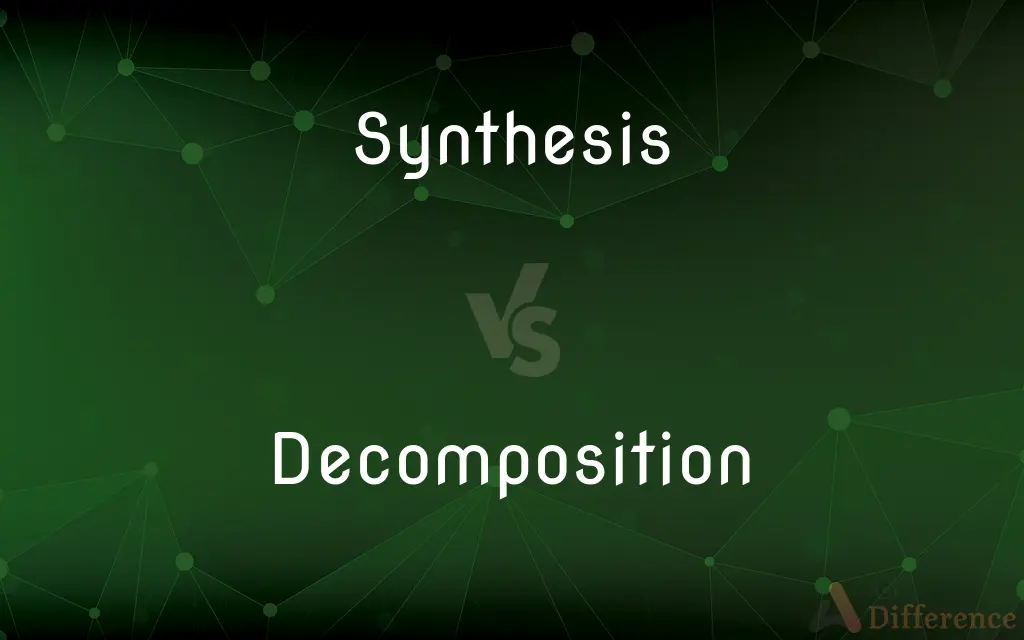Synthesis vs. Decomposition — What's the Difference?
By Maham Liaqat & Urooj Arif — Updated on April 22, 2024
Synthesis involves combining elements to form a complex substance, whereas decomposition involves breaking down compounds into simpler components.

Difference Between Synthesis and Decomposition
Table of Contents
ADVERTISEMENT
Key Differences
Synthesis typically refers to the process of combining simpler substances to create a more complex product, often involving chemical or biological reactions. Whereas, decomposition is the reverse, where complex substances are broken down into simpler molecules, commonly through chemical reactions or biological processes.
In chemical contexts, synthesis reactions often require energy input to form new bonds between atoms, resulting in complex molecules like polymers or synthetic compounds. On the other hand, decomposition reactions usually release energy as they break down compounds into simpler substances, such as the decomposition of organic matter.
Biological synthesis is evident in processes like photosynthesis, where plants synthesize glucose from carbon dioxide and water. Conversely, decomposition occurs in processes like respiration, where glucose is broken down to release energy, carbon dioxide, and water.
Industrial applications of synthesis include the manufacture of plastics, pharmaceuticals, and chemicals, which rely on the formulation of new compounds. In contrast, decomposition processes are crucial in waste management, recycling, and energy production from organic materials.
Environmental impacts also differ; synthesis processes can lead to pollution and resource depletion if not managed sustainably. Decomposition, however, plays a vital role in nutrient cycling and reducing waste through the natural breakdown of organic material.
ADVERTISEMENT
Comparison Chart
Definition
Process of forming a complex substance from simpler ones
Process of breaking down a substance into simpler forms
Energy
Generally requires energy input
Often releases energy
Example Processes
Photosynthesis, industrial chemical production
Respiration, composting
Products
More complex compounds
Simpler substances, basic elements
Environmental Impact
Can result in pollution and resource use
Helps in nutrient cycling and waste reduction
Compare with Definitions
Synthesis
The production of complex chemical substances from simpler ones.
Industrial synthesis of ethanol is fundamental in manufacturing and fuel industries.
Decomposition
In computer science, breaking down data structures into simpler components.
Decomposition of software systems can improve maintainability.
Synthesis
A method in music where sounds are electronically generated or combined.
Synthesis in music production can lead to unique soundscapes.
Decomposition
A chemical reaction that breaks down compounds into simpler products.
The decomposition of hydrogen peroxide into water and oxygen is catalyzed by enzymes.
Synthesis
A process that combines two or more entities to form something new.
The synthesis of ammonia by the Haber process is crucial for fertilizers.
Decomposition
The separation of a single mathematical expression into parts that are easier to handle.
Decomposition of complex numbers can simplify calculations.
Synthesis
The formation of ideas or theories by combining facts or information.
His synthesis of historical data provides a new perspective on the period.
Decomposition
Analyzing complex processes into their fundamental parts.
Decomposition in systems analysis helps identify core functionalities.
Synthesis
In biology, the creation of complex substances from simpler organic materials.
Protein synthesis is essential for cell repair and growth.
Decomposition
The process of decay in biological organisms.
The decomposition of organic matter enriches the soil with nutrients.
Synthesis
The combining of separate elements or substances to form a coherent whole.
Decomposition
Decomposition is the process by which dead organic substances are broken down into simpler organic or inorganic matter such as carbon dioxide, water, simple sugars and mineral salts. The process is a part of the nutrient cycle and is essential for recycling the finite matter that occupies physical space in the biosphere.
Synthesis
The complex whole so formed.
Decomposition
The act or result of decomposing; disintegration.
Synthesis
(Chemistry) Formation of a compound from simpler compounds or elements.
Decomposition
(Chemistry) Separation into constituents by chemical reaction.
Synthesis
Reasoning from the general to the particular; logical deduction.
Decomposition
(Biology) Breakdown or decay of organic materials.
Synthesis
The combination of thesis and antithesis in the Hegelian dialectical process whereby a new and higher level of truth is produced.
Decomposition
A biological process through which organic material is reduced to e.g. compost.
Synthesis
The formation of something complex or coherent by combining simpler things.
Decomposition
The act of taking something apart, e.g. for analysis.
Synthesis
(signal processing) Creation of a complex waveform by summation of simpler waveforms.
Decomposition
The splitting (of e.g. a matrix, an atom, or a compound) into constituent parts.
Synthesis
(chemistry) The reaction of elements or compounds to form more complex compounds.
Decomposition
The act or process of resolving the constituent parts of a compound body or substance into its elementary parts; separation into constituent part; analysis; the decay or dissolution consequent on the removal or alteration of some of the ingredients of a compound; disintegration; as, the decomposition of wood, rocks, etc.
Synthesis
(logic) A deduction from the general to the particular.
Decomposition
The state of being reduced into original elements.
Synthesis
(philosophy) The combination of thesis and antithesis.
Decomposition
Repeated composition; a combination of compounds.
Synthesis
(military) In intelligence usage, the examining and combining of processed information with other information and intelligence for final interpretation.
Decomposition
The analysis of a vector field
Synthesis
(rhetoric) An apt arrangement of elements of a text, especially for euphony.
Decomposition
In a decomposed state
Synthesis
(grammar) The uniting of ideas into a sentence.
Decomposition
(chemistry) separation of a substance into two or more substances that may differ from each other and from the original substance
Synthesis
(medicine) The reunion of parts that have been divided.
Decomposition
The organic phenomenon of rotting
Synthesis
Composition, or the putting of two or more things together, as in compounding medicines.
Decomposition
(biology) decaying caused by bacterial or fungal action
Synthesis
The art or process of making a compound by putting the ingredients together, as contrasted with analysis; thus, water is made by synthesis from hydrogen and oxygen; hence, specifically, the building up of complex compounds by special reactions, whereby their component radicals are so grouped that the resulting substances are identical in every respect with the natural articles when such occur; thus, artificial alcohol, urea, indigo blue, alizarin, etc., are made by synthesis.
Synthesis
The combination of separate elements of thought into a whole, as of simple into complex conceptions, species into genera, individual propositions into systems; - the opposite of analysis.
Analysis and synthesis, though commonly treated as two different methods, are, if properly understood, only the two necessary parts of the same method. Each is the relative and correlative of the other.
Synthesis
The process of producing a chemical compound (usually by the union of simpler chemical compounds)
Synthesis
The combination of ideas into a complex whole
Synthesis
Reasoning from the general to the particular (or from cause to effect)
Common Curiosities
How does synthesis differ in art versus science?
In art, synthesis involves combining various artistic elements to create a cohesive work, while in science, it typically refers to the chemical formation of new compounds.
Can decomposition be beneficial in ecosystems?
Yes, decomposition plays a crucial role in ecosystems by recycling nutrients and forming humus.
What is an example of decomposition in nature?
An example of natural decomposition is the breaking down of dead organic matter by microorganisms.
What is the importance of synthesis in technology?
Synthesis in technology often leads to the innovation of new materials and devices, enhancing functionality and efficiency.
How does decomposition relate to sustainability?
Decomposition processes are central to sustainable practices as they allow for the natural recycling of materials.
What is synthesis in chemistry?
In chemistry, synthesis refers to the process of combining simpler chemicals to form more complex ones.
How does decomposition affect environmental health?
Decomposition can affect environmental health positively by recycling nutrients and negatively if it releases harmful substances.
What role does synthesis play in learning?
Synthesis in learning involves integrating various pieces of information to form a comprehensive understanding.
What is an example of synthesis in everyday life?
An example is cooking, where ingredients are combined to create dishes.
What is thermal decomposition?
Thermal decomposition is the process where compounds break down into simpler substances due to heat.
What is data synthesis?
Data synthesis involves combining data from multiple sources to generate a unified database or conclusion.
How can synthesis be applied in environmental management?
Synthesis can be applied in environmental management by integrating various environmental studies to develop comprehensive management strategies.
How is decomposition used in data analysis?
In data analysis, decomposition is used to break down large datasets into smaller, understandable components.
What is the difference between decomposition and decay?
Decomposition is a broader term often involving chemical breakdown, whereas decay specifically refers to the breakdown of organic matter.
Why is synthesis important in chemical research?
Synthesis is crucial in chemical research for creating new compounds that can lead to new drugs, materials, or technologies.
Share Your Discovery

Previous Comparison
Binomial vs. Quadrinomial
Next Comparison
Tare vs. ZeroAuthor Spotlight
Written by
Maham LiaqatCo-written by
Urooj ArifUrooj is a skilled content writer at Ask Difference, known for her exceptional ability to simplify complex topics into engaging and informative content. With a passion for research and a flair for clear, concise writing, she consistently delivers articles that resonate with our diverse audience.














































